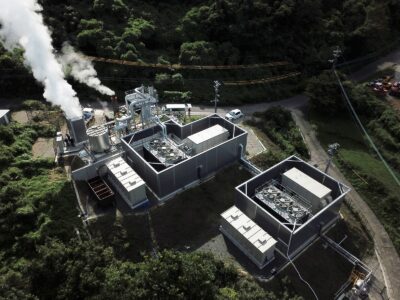Renewables and geothermal option for Pacific Islands like Fiji and Vanuatu
Decreasing dependency on fossil fuels is a great desire for island states in the Pacific. With the island's renewable energy resources such as wind, solar and geothermal, the islands could bring down electricity cost and become energy independent, so a recent news piece by IRENA.
While the islands of the Pacific are mostly known for their beautiful beaches, they currently derive most of their energy from fossil-fuel based electricity generation. But “recent assessments of renewable energy potential on the island states found that a combination of solar, wind, geothermal, marine, biomass and bio-fuel could meet their domestic energy needs while decreasing electricity costs, increasing energy access, and boosting their energy independence.
“Vanuatu has abundant renewable energy resources, including solar, geothermal, wind, biomass and biofuel, but is still dependent on imported fossil fuels. In recent years, the high cost of imported energy has hampered social and economic development. Accordingly, the government created a National Energy Roadmap, which aims to increase the share of renewables in the nation’s energy mix from 43% today to 63% by 2030. The Vanuatu Renewables Readiness Assessment outlines achievements towards this end and identifies areas for further action including capacity building and the development of off-grid renewables to bring modern energy services to the 83% of rural residents currently without.
In Vanuatu, KuTh Energy (now part of Geodynamics) has been working on a geothermal project. The future of this is though a little bit unclear. Some background here, with latest news from earlier this year.
“Fiji also depends heavily on imported petroleum-based fuels, which affects energy security and energy prices. As the costs of renewable energy technologies decline, Fiji is making more use of its renewable energy resources including hydropower, biomass, solar, geothermal and wind energy. Fiji’s National Energy Policy finds that it could feasibly achieve 100% of its energy from renewable sources by 2030, but reaching this target will require more action. The Fiji Renewables Readiness Assessment recommends implementing the National Energy Policy, improving coordination between agencies and exploring renewable-powered maritime transport and geothermal energy.”
There has been a private company looking into geothermal development in the country, but same here, the current status is unclear. Some background here with latest news from 2013.
“The development of local renewable resources in these island nations would decrease their dependency on fuel imports and reduce risks associated with oil price volatility. The falling costs of renewable energy offers them an opportunity to rethink their energy strategies, develop policies and build institutions that would create jobs, bring power to those currently without and deliver more reliable electricity services, all while combating climate change.” – IRENA Director-General Adnan Z. Amin
“Renewables Readiness Assessments (RRAs) offer a holistic evaluation of conditions for renewable energy deployment in a country and outline the actions necessary to further improve these conditions. Since 2011, more than 20 countries in Africa, the Middle East, Latin America, the Caribbean, Asia and the Pacific Islands have undertaken the RRA process with IRENA to accelerate the domestic deployment of renewable technologies.”
Source: IRENA News Room


















